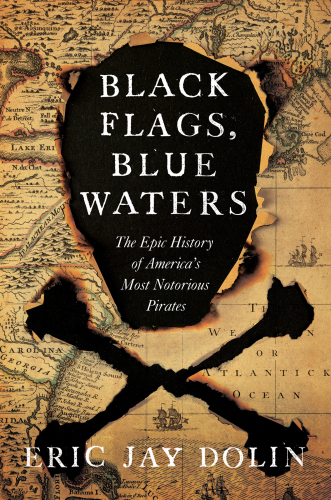
Black Flags, Blue Waters
The Epic History of America's Most Notorious Pirates
کتاب های مرتبط
- اطلاعات
- نقد و بررسی
- دیدگاه کاربران
نقد و بررسی

April 15, 2018
Not Johnny Depp charmers, the pirates who scoured the Atlantic for imperial treasures from the late 1600s through the 1700s were brutish, brutal mutineers, initially supported by colonists as fellow oppositionists to the Crown, then violently repulsed as the troublemakers they were. A billowing portrait from the author of Brilliant Beacons.
Copyright 2018 Library Journal, LLC Used with permission.

August 13, 2018
In this informative volume, Dolin (When America First Met China) focuses on “pirates who either operated out of America’s English colonies or plundered ships along the American coast” during the late 17th and early 18th centuries, a period dubbed the Golden Age of Piracy. While he is an unabashed fan of popular culture’s treatment of legendary pirates, and includes a chapter on that topic, Dolin more than meets his objective of separating fact from fiction and establishing that there was “absolutely nothing romantic about , other than the legends woven about their exploits after they were gone.” Graphic descriptions of violence, such as sexual assaults of passengers, debunk the image of pirates as appealing rogues. This is also more than just a litany of raids on prospective prey and battles between pirates and governments; for context, Dolin lays out the history of “political intrigue and collusion” between pirates and colonists who encouraged them because they enabled colonists “to obtain the goods and money they so desperately desired despite the onerous trade restrictions put in place by the mother country.” Dolin’s interpretations could be debated—he asserts that Capt. William Kidd was really a pirate—but this is nonetheless an excellent starting point for readers interested in this misunderstood chapter of American history.

A brief but intriguing history of piracy's heyday.The word "pirate" evokes numerous symbols and legends, but what were the pirates of yore actually like? Focusing on American waters during piracy's "Golden Age" of the late 17th and early 18th centuries, Dolin (Brilliant Beacons: A History of the American Lighthouse, 2016, etc.) explains that pirates thrived in times of war, when privateering commissions provided a cover for more illicit activities. For a time, North American colonists welcomed these brigands, who simultaneously spent their ill-gotten gains in Colonial ports and provided an effective counter to unpopular English trade laws. Inevitably, however, they wore out their welcome, and a multipronged response by Colonial and English authorities in the aftermath of Queen Anne's War (1702-1713) virtually eliminated them. The author helpfully dismisses some of the more potent pirate myths. For example, there is little evidence that Cpt. William Kidd buried treasure on Gardiner's Island, New York; pirates tended to spend their treasure right away, not inter it. Moreover, no documentation exists of any "Golden Age" pirate forcing someone to walk the plank. But Dolin is at his best when he offers generalizations of pirates and their trade. The majority of pirates were white men in their 20s, but a significant number were black slaves taken from captured ships who "became valued crewmembers who fought alongside their white pirate brethren and shared in the spoils." Despite their reputation for violence, most pirates "never wanted to fight if they could avoid it," as confrontation only put their lives, ships, and potential cargo in jeopardy. Finally, a pirate ship was a highly democratic and regulated place, as buccaneers selected their captains by majority vote and abided by a written code that "governed their behavior, the distribution of treasure, and the compensation provided in case of injury."A general lack of records compromises Dolin's efforts, leaving one wanting to know more about notorious pirates such as Blackbeard and Edward Low. Nonetheless, the author offers an informative and often entertaining blend of narrative history and analysis that should appeal to a general audience.
COPYRIGHT(2018) Kirkus Reviews, ALL RIGHTS RESERVED. (Online Review)

























دیدگاه کاربران